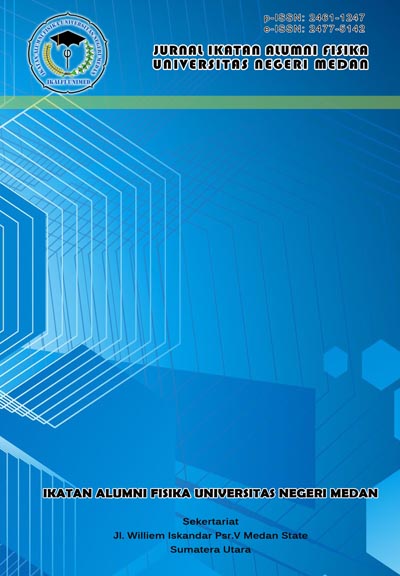EFFECT ON INQUIRY LEARNING MODEL STUDENT LEARNING OUTCOMES OF THE SUBJECT MATTER OF TEMPERATURE AND IN CLASS X CALORIFIC SEMESTER II SMA SWASTA IMELDA MEDAN A.Y 2016/2017
DOI:
https://doi.org/10.24114/jiaf.v4i1.10879Keywords:
Student learning, Inquiry, Student activityAbstract
This study aims to determine the effect of inquiry learning model to the learning outcomes of students in the subject matter of temperature and heat in SMA Swasta Imelda Medan A.Y. 2016 / 2017. Type this research is quasi experiment. The population in this study were all students of class X Semester II, which consists of three classes. Sampling was done by cluster random sampling. By taking two classes of third grade at random, that is class X-l as the experimental class using inquiry learning model and a class X-2 as the control class using conventional learning, each of which amounted to 32 people. The instrument used was a test of student learning outcomes that are 20 questions in the form of multiple choice and activity observation sheet. Hypothesis testing using t test with level α = 0,05. Result initial testing with pre-test values obtained average pretest experimental class is 48.28, and the average value pretest control class is 44.53. Pretest data testing through the second sample normality test showed normal distribution. In the homogenous eity test obtained Fcount = 108 and = 2.37 Ftable so Fhitung < Ftable then both samples come from a homogenous ous group. The results of data analysis of test two parties obtained tcount = 1.962 < ttable = 1,999 so that Ho accepted to mean both classes of the samples had the same initial capability. The average value postes experimental class and control class = 71.41 = 62.50. The results oft test analysis of the obtained t = 3.835 and ttable = 1.667 so thitung > ttable then Ho rejected and Ha accepted means there is significant influence inquiry learning model to the learning outcomes of students in the subject matter of temperature and heat in the tenth grade second semester SMA Swasta Imelda Medan A.Y 2016/2017.References
Arikunto, S., (2010), Prosedur Penelitian Suatu Pendekatan Praktik, Rineka Cipta, Jakarta.
Denny, S., (2015), Pengaruh Model Pembelajaran Inkuiri Terbimbing Terhadap Hasil Belajar Siswa pada Materi Pokok Listrik Dinamis di Kelas X Semester II SMA Negeri 14 Medan T.P. 2014/2015, Skripsi, FMIPA, Unimed, Medan.
Johnson, D., (2005), Teaching And Learning Research Exchange, Mcdowell Foundation, Canada.
Joyce, B., Weil, M., dan Calhoun, E., 2011, Models Of Teaching, Percetakan Pustaka Belajar, Yogyakarta.
Kuhlthau, C.C., Maniotes, L.K., dan Caspari, A.K., (2007), Guided Inquiry. Learning in 21st Century School, Greenwood Publishing Group, London.
Kuhlthau, C.C., Maniotes, L.K., dan Caspari, A.K., (2012), Guided Inquiry Design: a framework fo inquiry in your school, ebook: www.abc.clio.com. California.
Slameto, (2013), Belajar dan Faktor-faktor yang Mempengaruhinya, Rineka Cipta, Jakarta.
Sudjana, N., (2009), Penilaian Hasil Proses Belajar Mengajar, PT Remaja Rosdakarya, Bandung.
Wahyudin., Sutikno., dan Isa, A., (2010), Keefektifan Pembelajaran
Berbantuan Multimedia
Menggunakan Metode Inkuiri Terbimbing untuk Meningkatkan Minat dan Pemahaman Siswa, Jurnal Pendidikan Fisika Indonesia (JPFI) ISSN: 1693- 1246.
Trianto, (2009), Mendesain Model Pembelajaran Inovatif Progresif, Kencana. Jakarta
Downloads
Published
Issue
Section
License
Copyright (c) 2018 JURNAL IKATAN ALUMNI FISIKA

This work is licensed under a Creative Commons Attribution 4.0 International License.
Authors who publish with this journal agree to the following terms:- Authors retain copyright and grant the journal right of first publication with the work simultaneously licensed under a Creative Commons Attribution License that allows others to share the work with an acknowledgement of the work's authorship and initial publication in this journal.
- Authors are able to enter into separate, additional contractual arrangements for the non-exclusive distribution of the journal's published version of the work (e.g., post it to an institutional repository or publish it in a book), with an acknowledgement of its initial publication in this journal.
- Authors are permitted and encouraged to post their work online (e.g., in institutional repositories or on their website) prior to and during the submission process, as it can lead to productive exchanges, as well as earlier and greater citation of published work (See The Effect of Open Access).

